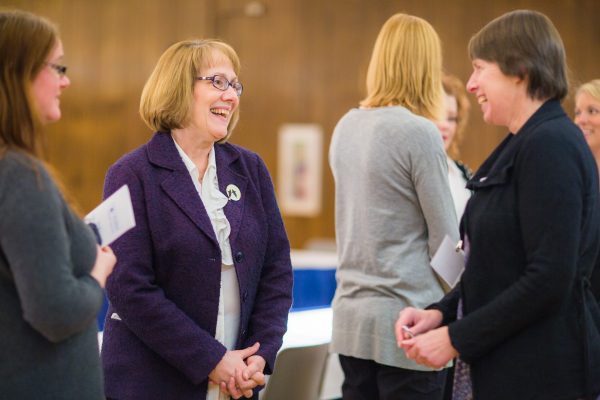Ehrlander finds comfort in northern roots
February 1, 2017
Kael Knight
907-474-2417

Download text and photo captions here.
What would you do with an unexpected $10,000? Most of us would buy something nice, spend a week away, or maybe invest. Most of us aren’t Mary Ehrlander, a University of Alaska Fairbanks history professor.
In December 2016, UAF honored Ehrlander’s years of dedication to her students by selecting her for the Emil Usibelli Distinguished Teaching Award.
Since 2001, Ehrlander, a passionate historian and scholar of the Arctic, has taught history in the UAF Arctic and northern studies program. She now directs the program.
“It was a big honor, it means so much to me,” Ehrlander said of the award. “While I’m very committed to all three of my work obligations, my teaching, my research and my service, I’ve always felt that my number one obligation and purpose here at the university was to teach.”
The Usibelli Award comes with $10,000 to use as the winner sees fit. Ehrlander used it, and a considerable amount of her own money, to create an endowed fund to finance Arctic and northern studies graduate students’ travel to academic conferences to present their research..
“I have thought about this for a long time actually, that it would be great to be able to do something like this. I’d like to be able to give back," she said. She used the fund to honor her father, Conrad Frank, who died in 2009.
“I thought this would be a nice way to honor him — he was a graduate of UA and a strong supporter of UAF — and be able to support the students in an ongoing way, especially after I’ve moved on,” she said.
Ehrlander is a northerner by all accounts, and you’d be hard pressed to find someone as dedicated to the region as she is. She was born and raised in Fairbanks, and attended Lathrop High School. After marriage and a three-year stay in Sweden (during which she learned to speak and read Swedish fluently), Ehrlander and her family returned home and she enrolled at UAF. She earned a bachelor's degree in political science in 1993. She became one of the first two graduates of UAF’s Master of Arts in northern studies program.
Ehrlander then started on a new path at the University of Virginia, supported by a James Madison Fellowship to do graduate work on the U.S. Constitution. There she earned a second master’s degree, followed by a doctorate in government, then returned home to Fairbanks and earned her secondary education teaching credentials at UAF. Ehrlander began teaching social studies at her old stomping ground, Lathrop High School. She taught history and the fundamental concepts of government to high school students for four years until getting the opportunity to teach at UAF.
Not only is Ehrlander a professor and director of a successful university program, she is also an author. Her doctoral dissertation, “Equal Education Opportunity: Brown’s Elusive Mandate,” on the history of school segregation in America, was published in 2002. Later in her career, she co-authored a book on education reform. More recently, Ehrlander published a translation of “Seventeen Years in Alaska,” a 1924 memoir of a Swedish missionary in Yakutat.
“Here was a great primary source document that told a lot about life in Yakutat, the relations between the church and the Tlingit people, between white people and Native people, and conditions in Alaska at the time, but very few people could read it,” she said.
Ehrlander’s fourth book, “Walter Harper: Alaska Native Son,” a biography of the first person to summit Denali, will be released this fall by the University of Nebraska Press.
Last year, she and Brandon Boylan, a UAF assistant professor of political science, organized the first fully international Model Arctic Council, a simulation of the work of the official Arctic Council, a high-level government forum that addresses issues of common concern in the circumpolar North. Sixty-five students representing 14 birth countries and 32 universities participated.
Ehrlander was delighted at the level of dedication those students displayed. “They were so impressed with each other, so there was an extraordinary synergy that was created,” she said.
“With climate change and global warming, there’s a lot of buzz about the Arctic. Sometimes we say the Arctic is ‘hot.’”
It’s safe to say Ehrlander is committed to the circumpolar North, and she has no plans to go anywhere else.
“I never had aspirations for teaching at Harvard or anything like that.” she said. "I love it here. I identify with the North, and I love the community of Fairbanks. It’s my home.”
To learn more about the Arctic and northern studies program, visit https://www.uaf.edu/arctic/.


